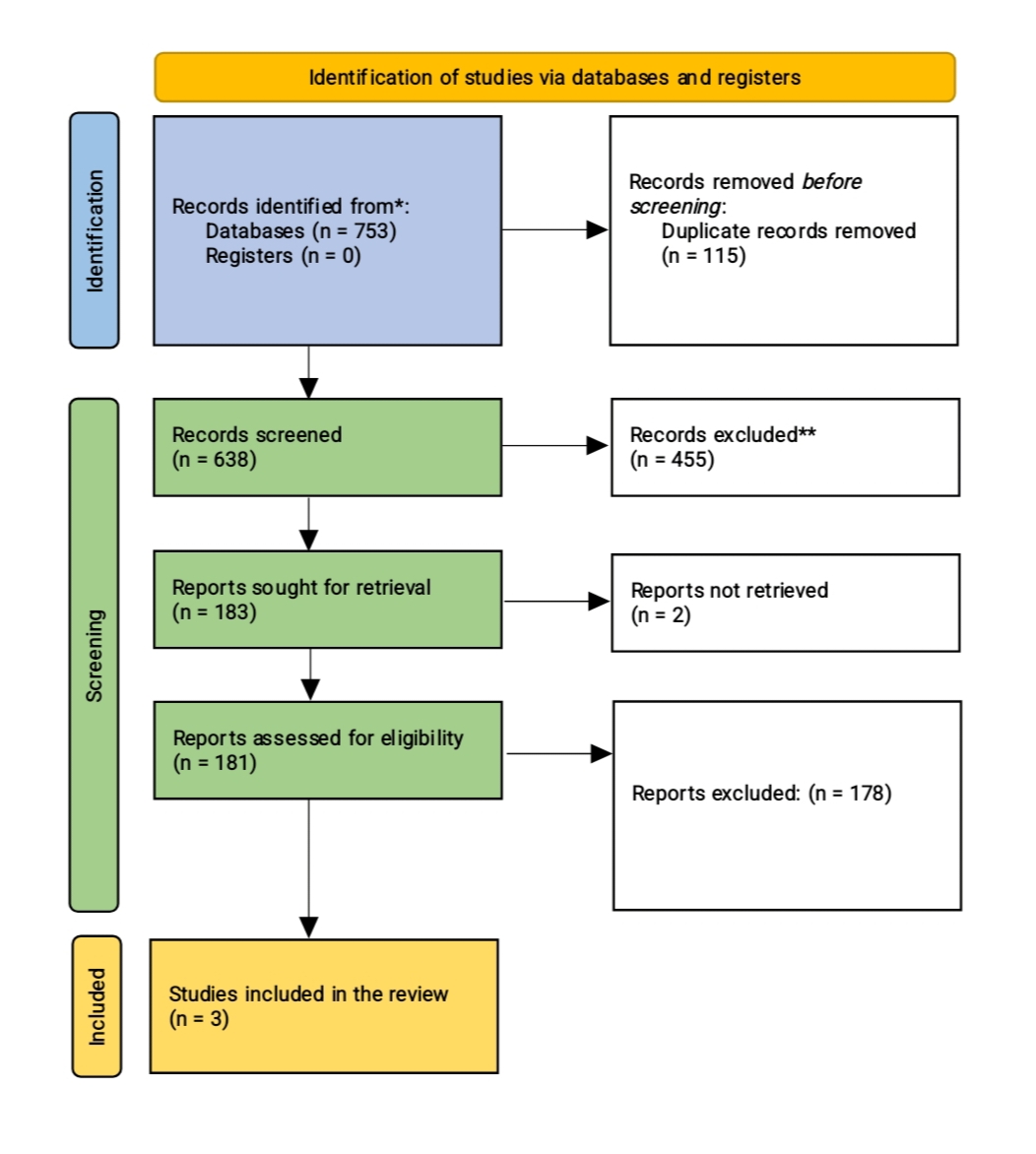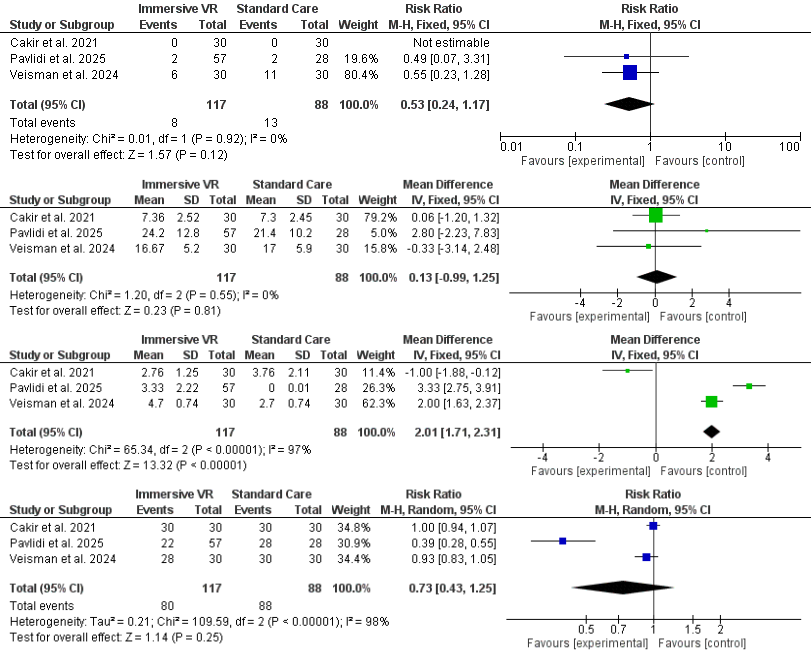Tuesday Poster Session
Category: Colon
P4549 - Immersive Virtual Reality During Un-Sedated Colonoscopy Is Safe and Workflow-Neutral, Providing a Drug-Free Platform for Future Analgesic Innovation - A Systematic Review and Meta-Analysis of Randomized Controlled Trials
.jpg)
Ashesh Das, MBBS
KPC Medical College and Hospital , Kolkata, India
Kolkata, West Bengal, India
Presenting Author(s)
1KPC Medical College and Hospital , Kolkata, India, Kolkata, West Bengal, India; 2Gayatri Vidya Parishad Institute of Health care and Medical Technology, Visakhapatnam, Andhra Pradesh, India; 3Lokmanya Tilak Municipal Medical College and General Hospital, Mumbai, Navi Mumbai, Maharashtra, India; 4Mediciti institute of medical sciences, Hyderabad, Telangana, India; 5Anhui Medical University, Hefei, Hefei, Anhui, China; 6Ayaan institute of medical sciences, Moinabad, Telangana, India; 7Kamineni Institute of Medical Sciences, Hyderabad, Telangana, India; 8A.J. Institute of Medical Sciences & Research Centre, Mangaluru, Karnataka, India; 9Bhaskar Medical College, Hyderabad, Telangana, India; 10Dow University of Health Sciences, Karachi, Sindh, Pakistan; 11Gcs medical college, Ahmedabad, Gujarat, India; 12Gandhi Medical College & Hospital, Hyderabad, Telangana, India
Introduction:
Although pharmacologic sedation enhances comfort during colonoscopy, it also raises costs, prolongs recovery, and carries cardiopulmonary risk, so many centers continue to perform the procedure without sedatives. Immersive virtual-reality (VR) distraction offers a drug-free alternative that could modulate pain perception and anxiety by immersing patients in vivid, multisensory environments.
Methods:
A systematic search of PubMed, Embase, Scopus, and Cochrane Library identified Randomized Controlled Trials (RCTs) evaluating Impact of Immersive Virtual Reality During Outpatient Sedation‐Free Colonoscopy through May 2025. Data were analysed using RevMan 4.2.1. Pooled risk ratios (RRs) with 95% confidence intervals (CIs) were calculated using Mantel-Haenszel methods. Random- or fixed-effects models were applied based on heterogeneity (Higgins’ I²). Statistical significance was set at p < 0.05. Risk of bias was assessed using RoB 2.0.
Results:
In three randomized trials involving 205 patients undergoing unsedated colonoscopy (VR = 117, control = 88), immersive virtual-reality distraction showed no significant safety concerns, with adverse events occurring in 8/117 versus 13/88 participants (pooled risk ratio 0.53, 95 % CI 0.24–1.17; I² = 0 %). Procedural metrics were likewise unaffected: caecal-intubation time differed by only 0.13 min (–0.99 to 1.25; I² = 0 %), and the likelihood of completing the examination without rescue sedation was similar (RR 0.73, 0.43–1.25; I² = 98 %). However, patient-reported pain was higher with VR, with a pooled mean difference of +2.01 on a 10-point VAS (1.71–2.31; I² = 97 %). Overall, immersive VR during unsedated colonoscopy appears feasible and procedurally neutral but does not reduce—and may increase—perceived discomfort, while posing no additional safety risks.
Discussion:
Immersive VR proved seamlessly deployable—no added risk, no delay to cecal intubation—confirming real-world feasibility in the busy endoscopy suite. Although pooled pain scores trended higher, this likely reflects sub-optimal headset fit and generic content rather than any inherent limitation of VR technology. With iterative gains in ergonomics, personalized media, and coordinated endoscopist–patient communication, VR remains a scalable, drug-free strategy poised to elevate patient experience while preserving efficiency. Larger, standardized trials should now focus on these modifiable factors to unlock VR’s full analgesic potential in unsedated colonoscopy.
Figure: Figure showing Forest Plots of Adverse Events, Duration of Procedure, Mean VAS Pain, Procedure Completed Without Rescue Sedation
Figure: Prisma Flowchart
Disclosures:
Ashesh Das indicated no relevant financial relationships.
Venkata Dileep Kumar Veldi indicated no relevant financial relationships.
Urvashi Bharia indicated no relevant financial relationships.
Ram Prasanjith Reddy indicated no relevant financial relationships.
Harshawardhan Dhanraj Ramteke indicated no relevant financial relationships.
Rakhshanda Khan indicated no relevant financial relationships.
Varshitha Kalidindi indicated no relevant financial relationships.
Shahana Latheefa Silmi indicated no relevant financial relationships.
Thanmayee Tummala indicated no relevant financial relationships.
Laiba Sajjad indicated no relevant financial relationships.
Kavya Darji indicated no relevant financial relationships.
Jeswitha Guduguntla indicated no relevant financial relationships.
Ashesh Das, MBBS1, Venkata Dileep Kumar Veldi, MBBS2, Urvashi Bharia, 3, Ram Prasanjith Reddy, MBBS4, Harshawardhan Dhanraj Ramteke, MBBS5, Rakhshanda Khan, MBBS6, Varshitha Kalidindi, MBBS7, Shahana Latheefa Silmi, MBBS8, Thanmayee Tummala, MBBS9, Laiba Sajjad, 10, Kavya Darji, MBBS11, Jeswitha Guduguntla, MBBS12. P4549 - Immersive Virtual Reality During Un-Sedated Colonoscopy Is Safe and Workflow-Neutral, Providing a Drug-Free Platform for Future Analgesic Innovation - A Systematic Review and Meta-Analysis of Randomized Controlled Trials, ACG 2025 Annual Scientific Meeting Abstracts. Phoenix, AZ: American College of Gastroenterology.
